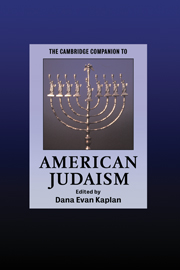Book contents
- Frontmatter
- Introduction
- Part I Historical overviews
- Part II Themes and concepts
- Section 1 Religious Culture and Institutional Practice
- Section 2 Identity and Community
- Section 3 Living in America
- 15 The American Jewish urban experience
- 16 "Sacred Survivial”revisited: American Jewish civil religion in the new millennium
- 17 Judaism and democracy in America
- 18 The economics of American Judaism
- 19 American Judaism and interfaith dialogue
- Section 4 Jewish Art in America
- Section 5 The Future
- Afterword
- Further reading
- Index
- Series list
17 - Judaism and democracy in America
from Section 3 - Living in America
Published online by Cambridge University Press: 28 May 2006
- Frontmatter
- Introduction
- Part I Historical overviews
- Part II Themes and concepts
- Section 1 Religious Culture and Institutional Practice
- Section 2 Identity and Community
- Section 3 Living in America
- 15 The American Jewish urban experience
- 16 "Sacred Survivial”revisited: American Jewish civil religion in the new millennium
- 17 Judaism and democracy in America
- 18 The economics of American Judaism
- 19 American Judaism and interfaith dialogue
- Section 4 Jewish Art in America
- Section 5 The Future
- Afterword
- Further reading
- Index
- Series list
Summary
In the mid-nineteenth century, the aptly named Know Nothings exempted America’s Jews from their suspicion of Catholics and recent immigrants. The Know Nothings felt that “however repugnant their religion may be, their religion is Republican…. Indeed, the Jews were the first Republican people in the world.” In their view, the Jews posed no threat to American democracy, having conformed their communal life and religious world view to American democratic norms and standards. With no clerical hierarchy or manifest loyalty to a foreign power, the Jews were able to accept and embrace the values of a free republic. Indeed, this Know Nothing author believed that the intrinsic and historic form of Jewish polity was republican, because of the Jews’ affinity for freedom and self-government
Despite the tarnished source, this dyspeptic compliment was correct in pointing out that the vast majority of American Jews had internalized the ethos of American democracy in a thoroughgoing way. Fundamental themes of constitutional democracy such as the derivation of authority from the consent of the governed, equality before the law, and the primacy of rights figure early on in American Jewish communal life and correspondence. The constitutions of early American synagogues, for example, transparently reflect the constitutional norms of the young democracy, often moderating earlier Jewish and republican motifs in favor of democratic egalitarianism. American Jews postulated a unique affinity between Jewish political and social ideals and those of the United States to such a degree that one scholar discerns a “cult of synthesis” as a persistent focus of American Judaism.
- Type
- Chapter
- Information
- The Cambridge Companion to American Judaism , pp. 299 - 314Publisher: Cambridge University PressPrint publication year: 2005
- 1
- Cited by



